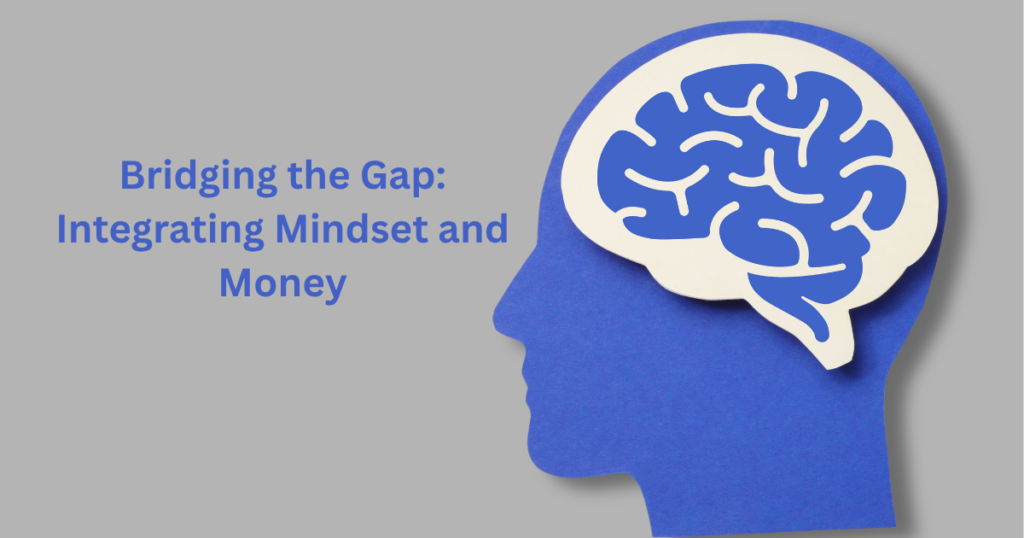What if the secret to a bigger bank account wasn’t a stock tip, a new side hustle, or a complicated budget, but something you already own: your brain?
For too long, we’ve separated personal growth from financial growth, treating them as two different subjects. But the truth is, your financial future is not determined by the market; it’s determined by your mind.
If you want to build lasting wealth, you must first build a stronger, more resilient self. This is the ultimate blueprint for turning self-improvement into financial empowerment.
The Unbreakable Link: How Personal Development Impacts Financial Success
The journey to financial success is less about math and more about psychology. Think about it: every financial decision you make from saving to investing to resisting impulse buys is a direct result of your mindset, discipline, and emotional regulation. Personal development is the process of strengthening these internal muscles.
The Ripple Effect of Personal Growth on Your Wallet
When you commit to personal development, you trigger a positive ripple effect that inevitably touches your finances:
- Improved Decision-Making: Training your mind (as we’ll discuss with neuroscience) enhances your frontal lobe, the area responsible for focus and rational decision-making. This means fewer emotional financial mistakes.
- Increased Earning Potential: Personal growth often involves acquiring new skills, improving communication, and boosting confidence, all of which make you more valuable in the marketplace and lead to higher income.
- Resilience to Setbacks: Financial life is full of unexpected expenses and market dips. A developed mindset sees failures as stepping stones, not roadblocks, preventing you from panicking and making costly, reactive decisions.
- Enhanced Discipline: The self-control required to stick to a budget, consistently save, and delay gratification is a direct transferrable skill from personal development practices like meditation and routine.
Also Read: Top Development Activities for Self-Improvement
Rewiring Your Brain for Wealth: The Neuroscience of Success
The most fascinating insight into financial success comes from neuroscience: your brain is not fixed. You can literally rewire it to be more productive, focused, and financially intelligent.
The Power of the Morning Ritual: Moving from Delta to Beta
Many people shock their system by jumping from deep sleep (Delta brain waves) straight into an active, stressed state (Beta waves) with a loud alarm. This puts your brain on the defensive. The secret to a successful day, and a successful financial life, is a gentle, intentional transition:
- Delta (Deep Sleep) → Theta (Dreamy State) → Alpha (Relaxed Focus) → Beta (Active Focus).
- The Theta-Alpha zone the state right after waking is extremely powerful for programming your mind.
The MOVERS Technique: Your 30-Minute Blueprint
Dr. Adatia’s MOVERS technique simplifies the science of high performance into a powerful, easy-to-implement morning ritual. Even five minutes per step can be transformative:
| Step | Acronym | Description | Financial Impact |
|---|---|---|---|
| M | Meditation | Sit quietly, eyes closed, letting thoughts flow. | Reduces stress and impulse spending; improves clarity. |
| O | Oxygenation | Focused breathwork (e.g., box breathing). | Calms the nervous system, leading to better financial decisions under pressure. |
| V | Visualization | Vividly imagine your financial goals and the person you need to become. | Activates the brain circuits for success, making goals feel achievable. |
| E | Exercise | Get your body moving (even a short walk). | Boosts energy, mood, and cognitive function for a productive workday. |
| R | Reading | Read something positive, inspiring, or financially educational. | Continuous learning and mindset reinforcement. |
| S | Scribing | Write down what no longer serves you (negative thoughts, limiting beliefs). | Releases mental clutter that holds back financial progress. |
Hacking Your Brain Waves: Alpha and Beta Training
To improve your focus, decision-making, and resilience all critical for financial success you need to train your brain waves:
- Alpha Waves (Relaxed Focus): Improved by sitting quietly with eyes closed for five minutes daily or grounding (walking barefoot on grass or sand). Alpha training enhances cognition, problem-solving, and the ability to think clearly under pressure.
- Beta Waves (Task Engagement): Improved by simple concentration exercises like tratak (staring steadily at an object). Healthy Beta activity is essential for problem-solving and executing complex financial tasks.
Aligning with Your Chronotype: Lion, Bear, Wolf, or Dolphin
Success isn’t about working harder; it’s about working smarter, aligned with your natural energy cycle. Knowing your chronotype helps you schedule your most challenging financial tasks (like budgeting or investment research) during your peak performance window:
- Lion: Early riser, peak energy in the morning (5–8 AM). Best for tackling complex tasks first thing.
- Bear: Wakes around 8 AM, peaks mid-morning (10–11 AM). Needs a steady, consistent schedule.
- Wolf: Gets energy later in the afternoon and stays active until midnight. Best for creative or deep work in the evening.
- Dolphin: Irregular sleep patterns. Needs to focus on consistency and managing energy spikes.
The Financial Habits of Successful People: Principles and Rules
Once your mindset is optimized, you need a clear, actionable financial framework. Successful people don’t rely on luck; they rely on proven principles and rules that manage their money automatically.
The 7 Pillars of Financial Success
Financial planning is a structure built on solid foundations. These seven pillars ensure your financial house is strong and resilient:
- Goal Setting: Define clear, measurable financial goals (e.g., “Save $10,000 for a down payment by 2028”). A goal without a deadline is just a wish.
- Budgeting and Cash Flow Management: Knowing exactly where every dollar goes. This is the foundation of control.
- Emergency Fund: Building a liquid savings cushion (3–6 months of living expenses) to prevent unexpected events from derailing your progress.
- Debt Management: Systematically paying down high-interest debt, often using methods like the debt snowball or avalanche.
- Investment for the Future: Putting your money to work through retirement accounts (401k, IRA) and diversified investments.
- Risk Management (Insurance): Protecting your assets and income with proper insurance (life, health, disability, property).
- Estate and Legacy Planning: Ensuring your wishes are carried out and your wealth is transferred efficiently.
Budgeting Made Simple: The 70/20/10 Rule
While the 50/30/20 rule is popular, the 70/20/10 rule offers a slightly different, often more flexible, approach to budgeting your after-tax income:
- 70% for Needs and Wants (Living Expenses): This covers all your monthly bills, utilities, housing, groceries, and discretionary spending. The goal is to live comfortably within this limit.
- 20% for Savings and Debt Repayment: This is your engine for wealth building. It should be split between high-interest debt payoff and long-term savings/investments.
- 10% for Giving/Lifestyle: This portion is often allocated to charity, personal development, or guilt-free spending that brings you joy.
Dave Ramsey’s 7 Baby Steps: A Debt-Free Roadmap
For those struggling with debt, Dave Ramsey’s system provides a clear, sequential path to financial freedom. The power of this method lies in its simplicity and focus on behavioral change:
- Save $1,000 for a Starter Emergency Fund: A quick win to cover small emergencies and prevent new debt.
- Pay Off All Debt (Except the House) Using the Debt Snowball: List debts smallest to largest, pay minimums on all but the smallest, and attack that one aggressively.
- Save 3–6 Months of Expenses in a Fully Funded Emergency Fund: This is your true financial safety net.
- Invest 15% of Your Household Income for Retirement: Start building long-term wealth.
- Save for Your Children’s College Fund: Plan for future education expenses.
- Pay Off Your Home Early: The ultimate goal of being 100% debt-free.
- Build Wealth and Give: Live and give like no one else.
The 5 C’s of Credit: Mastering Financial Trust
Your credit score is a reflection of your financial responsibility. Lenders use the “5 C’s” to assess your creditworthiness. Understanding and improving these is crucial for securing favorable loan terms:
- Character: Your credit history, including payment timeliness and debt management.
- Capacity: Your ability to repay the loan, assessed by your debt-to-income ratio.
- Capital: Your personal investment in the venture, showing you have skin in the game.
- Collateral: Assets you pledge to secure the loan (e.g., a house for a mortgage).
- Conditions: The purpose of the loan and the economic environment.
H3: The 1% Rule in Real Estate: A Quick Investment Check
For those interested in real estate, the 1% rule is a simple metric to quickly evaluate a potential rental property:
- The Rule: The gross monthly rent should be at least 1% of the property’s purchase price.
- Example: A house purchased for $200,000 should rent for at least $2,000 per month.
- Purpose: It’s a quick filter to ensure the property has a high likelihood of generating positive cash flow, though it is not a substitute for a full financial analysis.
Also Read: Be 1% Better Every Day: The Art of Continuous Improvement
Bridging the Gap: Integrating Mindset and Money
The real magic happens when you stop treating personal development and financial strategy as separate entities and start integrating them.
The Mind-Body-Money Connection
The stories of the brain’s limitless potential like people gaining muscle strength just by visualizing exercise prove that your thoughts have a tangible impact on your reality.
- Visualization for Financial Goals: Spend five minutes every morning visualizing your debt-free life, your investment portfolio, or your ideal career. This is not wishful thinking; it’s activating the neural pathways that will drive the actions needed to achieve those goals.
- Awareness and Healing: Just as awareness is the key to healing emotional pain, it is the key to healing financial pain. Be aware of your spending triggers, your financial fears, and your limiting beliefs. Once you see them clearly, you can use your trained mind to implement consistent daily habits that lead to financial health.
Overcoming the Brain’s Natural Laziness
Your brain is naturally wired to be lazy and to procrastinate. This is a survival mechanism, not a personal flaw. To overcome it, you need to attach meaning to your hard tasks.
- The Purpose Book: Maintain a “purpose book” where you clearly articulate your financial mission. If your purpose is strong enough (e.g., “to provide generational security for my family”), then five minutes of extra sleep or an impulse purchase becomes a compromise of that mission.
- Meaning Activates the Brain: When you understand why you are budgeting, saving, or investing, your brain shifts from resistance to support. It’s the difference between being told to save and choosing to save because it aligns with your deepest values.
The ANTs (Automatic Negative Thoughts) of Finance
Negative thinking is automatic. We all have ANTs Automatic Negative Thoughts especially around money (“I’ll never get out of debt,” “I’m not smart enough to invest”).
- The Solution: Consistent personal development practices (Meditation, Scribing) rewire your physiology so that negativity stops dominating. You learn to challenge the ANTs and replace them with empowering, financially positive affirmations.
Read Also: How to Stop Negative Thoughts
The Final Step: Consistency and Resilience
The difference between those who achieve financial success and those who don’t is not intelligence or luck; it’s consistency and resilience.
Seeing Failure as a Stepping Stone
Successful people train their frontal lobe to handle failure. They don’t let a bad investment or a budget slip-up derail their entire plan. They see it as data, learn the lesson, and adjust their course.
- The Ferrari Story: Just like the uncle who remained calm when his Ferrari broke down, understanding that external brakes (illness, market crash) and internal brakes (stress, burnout) are inevitable allows you to handle problems with calm and clarity. Your trained mind is your internal brake system.
The Limitless Potential of the Trained Mind
Everyone has the same 24 hours and similar physiological capacity. The difference is in awareness and training.
- Self-Awareness is Control: Knowing your chronotype, understanding your spending triggers, and recognizing your brain’s natural tendencies gives you control over your life instead of reacting to it.
- Continuous Practice: Success comes from having good ideas, implementing them consistently, building resilience, and continuing despite setbacks. All these qualities are a direct result of the daily, small acts of personal development you commit to.
Learn how the top 1% manage their money with simple, practical strategies anyone can follow. This guide breaks down wealth building into clear steps you can start today.
Conclusion: Your Wealth Journey Starts Today
Financial success is not a destination; it’s a reflection of the person you become on the journey. By committing to personal development by training your mind, understanding your energy, and implementing proven financial strategies you are not just saving money; you are investing in your most valuable asset: yourself.
Start small. Implement one step of the MOVERS technique tomorrow morning. Choose one financial rule to follow this month. The moment you spend the first five minutes doing something productive, your brain automatically shifts into gear.
Your financial future is waiting. All you have to do is train your mind to claim it.
Also Read: Work-Life Balance: A Complete Guide
Frequently Asked Questions (FAQ’s) on “How Personal Development Impacts Financial Success”
How does personal development affect my finances?
Personal development strengthens your mindset, discipline, and decision-making skills, which are the psychological foundations for all sound financial choices. It increases your earning potential and builds the resilience needed to handle financial setbacks without panic.
What is the MOVERS technique?
MOVERS is a powerful morning ritual acronym for Meditation, Oxygenation, Visualization, Exercise, Reading, and Scribing. It is a science-backed method to gently transition your brain into a productive state, optimizing your focus and energy for the day.
What are the 7 Pillars of Financial Success?
They are the seven foundational areas of a strong financial life: Goal Setting, Budgeting, Emergency Fund, Debt Management, Investment, Risk Management (Insurance), and Estate Planning. Mastering these ensures your financial house is built on solid ground.
What is the 70/20/10 rule?
This is a simple budgeting method where you allocate 70% of your after-tax income to living expenses, 20% to savings and debt repayment, and 10% to giving or guilt-free lifestyle spending. It provides a flexible framework for consistent saving.
What are the 5 C’s of Credit?
The 5 C’s are the criteria lenders use to assess your creditworthiness: Character, Capacity, Capital, Collateral, and Conditions. Understanding them is key to improving your credit score and securing favorable loan terms.






